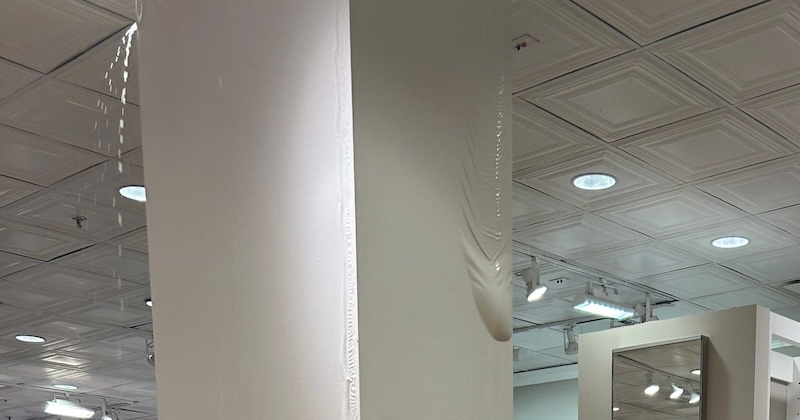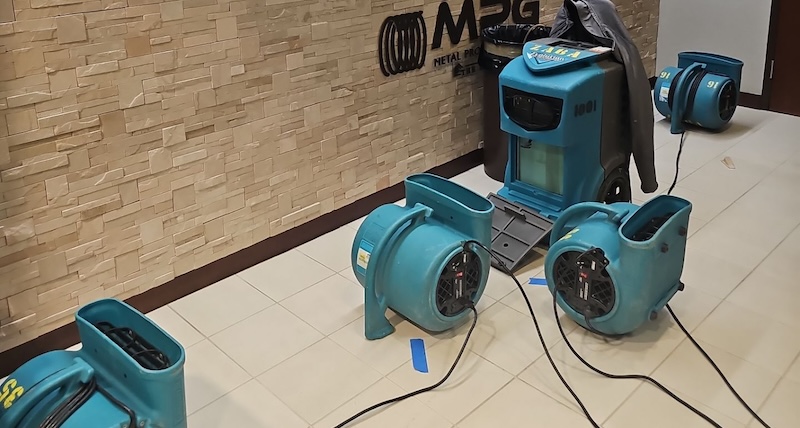A leaking roof at your commercial building isn’t just annoying—it can stop operations, damage equipment, jeopardize safety, and rack up repair bills fast.
In a city like Chicago, where the weather can go from freezing sleet to pouring rain in a day, roof problems can pop up without warning.
At ServiceMaster Restoration by Zaba, we’ve been helping local businesses deal with ceiling water damage repair for over 15 years, so we know how important it is to act quickly when the roof starts leaking.
Here’s what to do right away if you’re dealing with this situation.
Key Takeaways
- A leaking commercial roof requires immediate attention—delaying repairs can lead to major water damage, safety hazards, and costly downtime.
- When a leak happens, start by making the area safe, protect your property, try to spot the source, call a professional, contact your insurance, and schedule a full roof inspection.
- Experienced local restoration teams, like ServiceMaster by Zaba, can help manage cleanup, repairs, and insurance coordination to get your business back on track.
6 Steps to Take When Your Commercial Roof Leaks in Chicago

1. Start with Safety
First things first—make sure the area is safe. If you see water dripping or pooling on the floor, rope off the area. Wet floors are slippery, and ceiling damage could be worse than it looks.
Move any equipment, stock, or furniture out of the way. Use buckets or plastic sheeting to catch the water.
2. Try to Find the Leak
If it’s raining or snow is melting, the leak might be easy to spot. But commercial roofs, especially flat ones, often hide the source.
Here are a few common problems we see around Chicago buildings:
- Cracks or punctures in the roof membrane
- Blocked or frozen drains and gutters
- Loose flashing around skylights or HVAC units
- Ice dams during winter
3. Call for Professional Help
Once you’ve controlled the immediate mess, bring in a restoration team.
At ServiceMaster Restoration by Zaba, we handle commercial roof leaks regularly, especially after storms.
We’ll stop the leak, clean up the water, dry everything out, and handle any repairs. We also check for mold and other hidden damage that can turn into bigger problems later.
We’re available 24/7. Just call us and we’ll take it from there.
4. Let Your Insurance Company Know
Most commercial insurance policies cover sudden water damage from things like storms or falling debris.
Don’t wait—call your agent, get a claim number, take photos of the damage, and keep receipts from any emergency repairs.
If we’re doing the restoration, we’ll help with the documentation and talk directly with your insurance company.
5. Schedule a Roof Inspection
After the cleanup, have your whole roof inspected. Chicago’s weather is tough on commercial roofs. Snow, ice, heavy rain, and heat all cause wear and tear.
An inspection can spot issues like:
- Pooling water
- Cracked or bubbled roofing
- Blocked drains
- Loose or damaged flashing
- Old age (most flat roofs last about 20 years)
Fixing small problems now can save you from major damage later.
6. Don’t Wait for the Next Leak
Regular roof maintenance is one of the best things you can do. Here’s how to stay ahead of it:
- Get a professional roof check twice a year (spring and fall)
- Keep gutters and roof drains clear
- Trim trees near the building
- Watch for ceiling stains or musty smells
Leaks never happen at a good time—but maintenance can keep them from happening at all.
Need Help with a Roof Leak in Chicago? We’re Ready.

If your commercial roof is leaking, don’t wait. Water damage gets worse the longer it sits.
At ServiceMaster by Zaba, we help businesses with commercial water damage restoration all over Chicago—downtown and in neighborhoods like Wicker Park, Humboldt Park, and suburbs like Skokie and Evanston.
We service warehouses, office buildings, schools, government buildings and more.
Call us at (773) 647-1985 anytime, day or night. We’ll handle the cleanup and get your business back on track.
FAQs
Do I need to fix a roof leak right away?
Yes, don’t wait. Even a small drip can turn into a big, expensive problem fast. Water spreads quickly—it can ruin ceilings, damage equipment, and lead to mold.
The sooner you fix it, the less you’ll have to deal with later.
Is there a temporary fix I can do until help arrives?
If you can safely reach the area, you can lay down a tarp or use roofing tape to slow the leak.
It won’t solve the problem, but it can keep more water from getting in while you wait for a professional. Just make sure it’s safe—don’t risk getting hurt to patch it.
What’s the repair going to cost me?
Every job is different. A small fix could be a few hundred bucks. If water’s gotten into the walls or flooring, it’ll cost more. The sooner you catch it, the cheaper it usually is.
How often should I be checking the roof?
Twice a year—once in the spring and again in the fall. Also after big storms. A quick look now and then can save you from bigger trouble down the road.